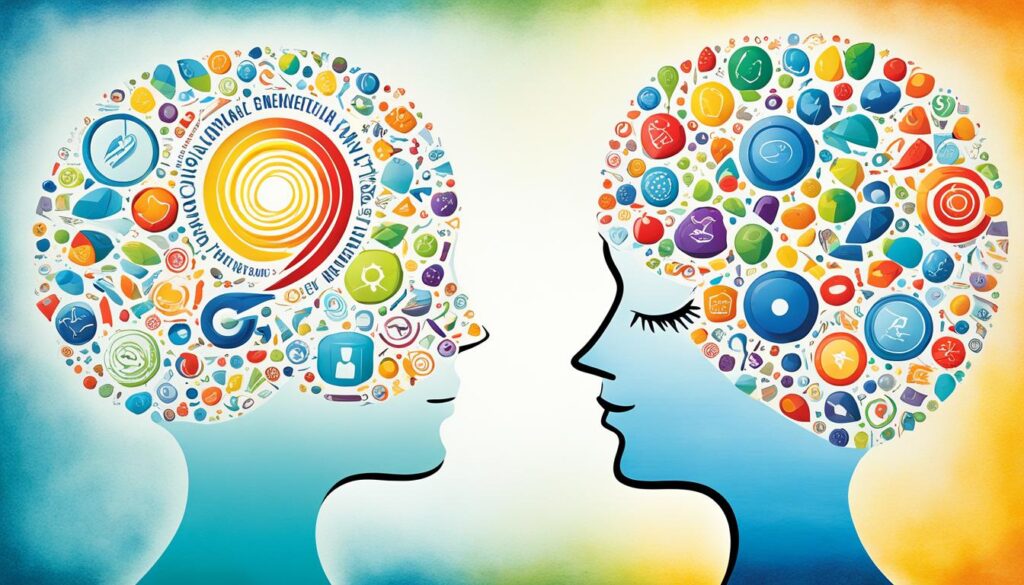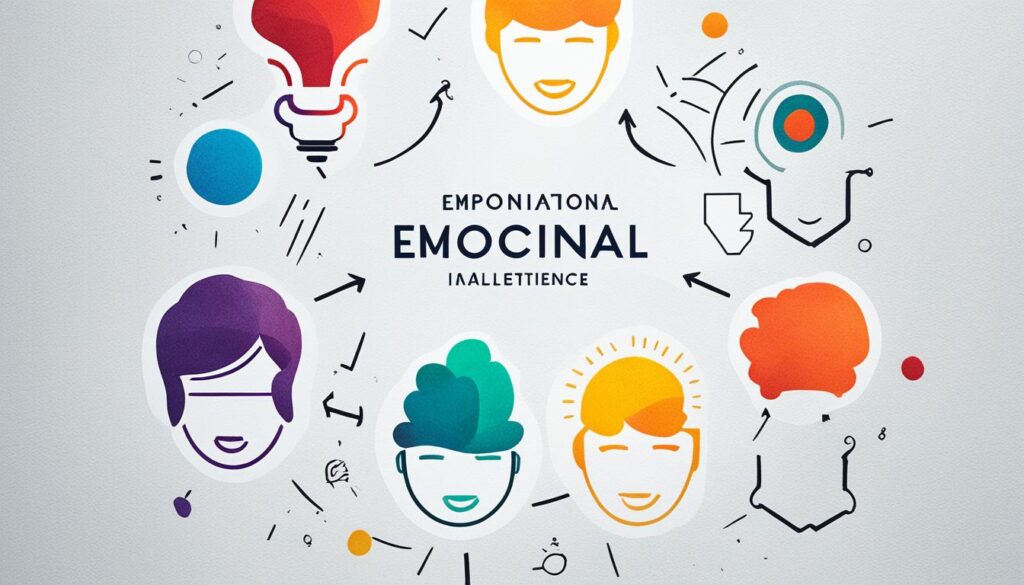Imagine you’re in a critical meeting where everyone is getting upset. Then, your boss steps in with a few words and stays calm. This shows how emotional intelligence works. It’s a key skill for leaders today.
Emotional intelligence is vital for leaders. It makes a big difference between good and great leaders. Now, 71% of employers look for emotional intelligence more than technical skills when hiring. This shows how important it is to understand and manage emotions at work.
Being aware of your own emotions is the first step in emotional intelligence. It helps you know how your feelings affect your choices and how you talk to others. Leaders who know themselves well can handle stress better, give feedback, and work well with their teams.
A study by TalentSmart found emotional intelligence is the best predictor of success at work. This proves how important EI is for leaders. It’s not just about being smart or skilled. It’s about having the emotional smarts to lead and motivate others.
Key Takeaways
- 71% of employers prioritize emotional intelligence over technical skills
- Emotional intelligence is the top predictor of workplace performance
- Self-awareness is crucial for effective leadership
- EI enhances stress management and collaboration skills
- Emotionally intelligent leaders are better at inspiring and motivating teams
Understanding Emotional Intelligence in Leadership
Emotional intelligence (EI) is key for good leadership. It means managing your own feelings and using empathy to lead teams. Let’s dive into what this means and how it affects work.
Defining Emotional Intelligence
Emotional intelligence has four main parts: self-awareness, self-regulation, social awareness, and managing relationships. These skills help leaders deal with tough social situations and build strong bonds with their team.

The Evolution of EQ in the Workplace
Psychologists Peter Salovey and John D. Mayer brought up emotional intelligence in 1990. Now, it’s a vital skill for leaders. Research shows that those with high EI tend to stay in their jobs longer and get promoted more often.
How EQ Differs from IQ in Leadership
IQ is about thinking and solving problems, while EQ is about people skills and managing feelings. Leaders with strong EI can handle change well, motivate their team, and create a positive work atmosphere. They’re great at solving conflicts and making decisions by understanding their feelings and others’ views.
“Effective communication is a key quality for leaders, and those with high emotional intelligence can adjust their communication style to suit their audience, resulting in more productive interactions.”
Leaders who focus on managing their emotions create supportive workplaces. This leads to happier, more motivated employees. By being empathetic and skilled in social interactions, they motivate their team, boosting performance and productivity.
The Four Components of Emotional Intelligence
Emotional intelligence is key for great leadership. Daniel Goleman, from the book “Emotional Intelligence,” talks about four main areas that make leaders emotionally smart. These areas help build teams that understand emotions well and lead with emotional strength.

First, self-awareness means knowing your feelings and how they affect others. Leaders with this skill know their good and bad points. This helps them make smarter choices.
Next, self-management is about keeping your feelings in check and staying positive, even when things get tough.
Then, social awareness lets leaders see and understand the feelings of others and how the team works together. This skill is key for solving problems and making strong connections. Last, relationship management includes skills like leading, coaching, and fixing conflicts.
“Emotional intelligence can lead to more emotionally balanced and effective leadership.”
Leaders who get these four parts can manage their team’s feelings well. This leads to better work and happier employees. By working on these skills, leaders can make a positive workplace. This means fewer people leave, and work gets done faster.
- Self-awareness: Understanding one’s emotions and their impact
- Self-management: Controlling emotions and maintaining positivity
- Social awareness: Recognizing others’ emotions and organizational dynamics
- Relationship management: Influencing, coaching, and resolving conflicts
Getting better at emotional intelligence takes time and effort. But, the benefits are huge. Leaders with high emotional smarts handle challenges better, motivate their teams, and build a trusting, collaborative work culture.
Importance of Emotional Intelligence in Leadership
Leadership success depends on emotional intelligence. Leaders who are skilled in this area motivate and influence their teams well. They create positive work environments and help teams succeed. Their impact goes beyond just talking to people, shaping the whole culture of an organization.
Enhancing Team Performance
Emotionally smart leaders make their teams work better by building trust and open communication. They know what each team member is good at and what they struggle with. This makes them change how they lead to fit everyone’s needs. This approach makes employees feel important and understood, leading to more engagement and productivity.
Improving Decision-Making Skills
Being emotionally intelligent means making decisions that think about people’s feelings too. Leaders who do this make choices that are smart and kind. They think about how their decisions affect people, making sure they help both the company and its workers.
Building Stronger Relationships
Leaders with high emotional intelligence are great at making and keeping relationships. They handle tricky social situations well, solve conflicts, and work together better. This leads to a supportive work place where new ideas can grow.

| EI Component | Impact on Leadership |
|---|---|
| Self-awareness | Improved decision-making, authentic leadership |
| Self-management | Stress reduction, better crisis management |
| Social awareness | Enhanced team dynamics, empathetic leadership |
| Relationship management | Stronger team bonds, effective conflict resolution |
The World Economic Forum’s 2020 Future of Jobs report says emotional intelligence is key for leaders in all fields. It shows how important it is in today’s fast-changing business world. By focusing on emotional intelligence, leaders can build strong, successful teams ready for the future.
Identifying and Developing Emotional Intelligence
Emotional intelligence is key for great leadership. Leaders who grow their emotional smarts make better work places and motivate their teams. To get better at emotional intelligence, leaders need to reflect on themselves, keep learning, and use what they learn in real life.
Improving emotional smarts starts with knowing your own feelings and how they affect others. Leaders can get better at this by:
- Journaling to track emotional patterns
- Seeking feedback from colleagues and team members
- Participating in 360-degree assessments
- Engaging in mindfulness exercises
Being empathetic is also vital. Leaders who care about their team’s feelings can connect better with them. To be more empathetic, leaders can:
- Practice active listening
- Observe non-verbal cues
- Put themselves in others’ shoes
- Seek diverse perspectives
Knowing your own and others’ feelings helps leaders make better decisions and solve conflicts. This balanced view leads to peaceful solutions.
Leaders can boost their emotional smarts by taking training or online courses on EI. These programs offer insights and tools to improve leadership and create a positive work culture.
The Impact of Emotionally Intelligent Leaders on Organizations
Emotionally intelligent leaders change the game for organizations. They make work places better, making employees more engaged and productive. Their skills help the whole company, not just how they talk to people.
Increased Employee Engagement
Leaders with high emotional smarts connect better with their teams. They know how to handle feelings, making jobs more satisfying and people more loyal. This skill helps solve conflicts with understanding, making work a happier place.
Improved Organizational Culture
These leaders build trust and open talks. They show how to manage feelings and bounce back from tough times. This leads to a team that works well together and respects each other, key for success over time.
Enhanced Productivity and Profitability
Being emotionally smart helps leaders lead better. They spark new ideas, keep good people, and make smart choices. Studies show that leaders with high EI can really boost profits.
| Impact Area | Percentage Improvement |
|---|---|
| Employee Engagement | 40% |
| Team Cohesion | 35% |
| Decision-Making Effectiveness | 50% |
| Profitability | Up to 100% |
Leaders with emotional smarts drive success in organizations. They boost engagement, culture, and productivity. This leads to workplaces that beat the competition.
Conclusion
Emotional intelligence in leadership is very important. Since Mayer and Salovey introduced it in 1990, it has become key for good leadership. Leaders with high emotional intelligence are great at understanding themselves, communicating well, and building trust.
Leaders with emotional intelligence make a big difference. They know that 74% of employees want empathetic bosses and 70% value mental health support. These leaders create safe spaces that make teams work better and more productively. They also keep their teams happy, reduce turnover, and solve conflicts better.
As companies change, emotional intelligence in leadership is becoming more important. By improving their EQ, leaders can make their teams work better, make smarter choices, and build stronger relationships. This makes the company culture better and increases productivity and profits. Emotional intelligence is a must-have skill for leaders today and those who want to be leaders.
FAQ
What is emotional intelligence (EI) and why is it important for leaders?
Emotional intelligence (EI) means understanding and managing your own feelings and others’. It’s key for leaders because it helps them guide teams, handle stress, give feedback, and work together well. Studies show EI is more important than IQ and skills for success.
What are the four core components of emotional intelligence?
Emotional intelligence has four main parts: self-awareness, self-management, social awareness, and relationship management. Self-awareness is knowing your feelings, strengths, and weaknesses. Self-management is about keeping your emotions in check and staying positive.
Social awareness is about noticing others’ feelings and understanding the group’s dynamics. Relationship management is about influencing, coaching, and solving conflicts.
How can emotional intelligence enhance team performance and decision-making skills?
Leaders with high EI create a positive workplace and boost employee involvement, leading to better team results. They make smarter choices by thinking about feelings and logic. EI helps leaders build strong bonds with their team, creating trust and open talks.
What are some ways to identify and develop emotional intelligence?
To boost EI, leaders can try journaling, getting feedback, and doing 360-degree reviews. It’s important to listen well and know your own feelings. There are also training programs and online courses to help improve EI.
How does emotionally intelligent leadership impact organizations?
Leaders with high EI make a big difference in companies. They get more employees involved, make the workplace better, and boost productivity and profits. Studies show that top leaders with strong EI can almost double a company’s earnings.
Source Links
- https://online.hbs.edu/blog/post/emotional-intelligence-in-leadership

- https://www.ccl.org/articles/leading-effectively-articles/emotional-intelligence-and-leadership-effectiveness/

- https://semaphoreci.com/blog/emotional-intelligence-leadership

- https://leadershipthoughts.com/the-importance-of-emotional-intelligence-in-leadership/

- https://blog.flock.com/the-role-of-emotional-intelligence-in-leadership

- https://www.sorenkaplan.com/importance-of-emotional-intelligence-in-leadership/

- https://www.kornferry.com/insights/this-week-in-leadership/emotional-intelligence-skills-coronavirus-leadership

- https://www.vistage.com/research-center/business-leadership/organizational-culture-values/20240315-emotional-intelligence/

- https://blog.iil.com/understanding-the-importance-of-emotional-intelligence-in-leadership/

- https://www.snhu.edu/about-us/newsroom/career/the-importance-of-emotional-intelligence-in-leadership

- https://www.forbes.com/sites/forbesbusinesscouncil/2023/07/25/why-emotional-intelligence-is-crucial-for-effective-leadership/

- https://emeritus.org/in/learn/why-emotional-intelligence-is-important-in-leadership/

- https://www.calm.com/blog/emotional-intelligence-in-leadership

- https://nccusa.edu/blog/the-role-of-emotional-intelligence-in-leadership/

- https://6q.io/blog/emotional-intelligence-in-leadership/

- https://coactive.com/resources/blogs/impact-of-emotional-intelligence-on-leadership-ZGM

- https://www.ncbi.nlm.nih.gov/pmc/articles/PMC10543214/

- https://www.cgp.sg/leadership/the-importance-of-emotional-intelligence-in-leadership/

- https://www.sogolytics.com/blog/eq-the-importance-of-emotional-intelligence-in-leadership-today/

- https://www.forbes.com/sites/forbesbusinesscouncil/2023/10/11/the-importance-of-emotional-intelligence-in-business-leadership/

- https://timesofindia.indiatimes.com/blogs/krishna-athal/the-importance-of-emotional-intelligence-in-leadership/


